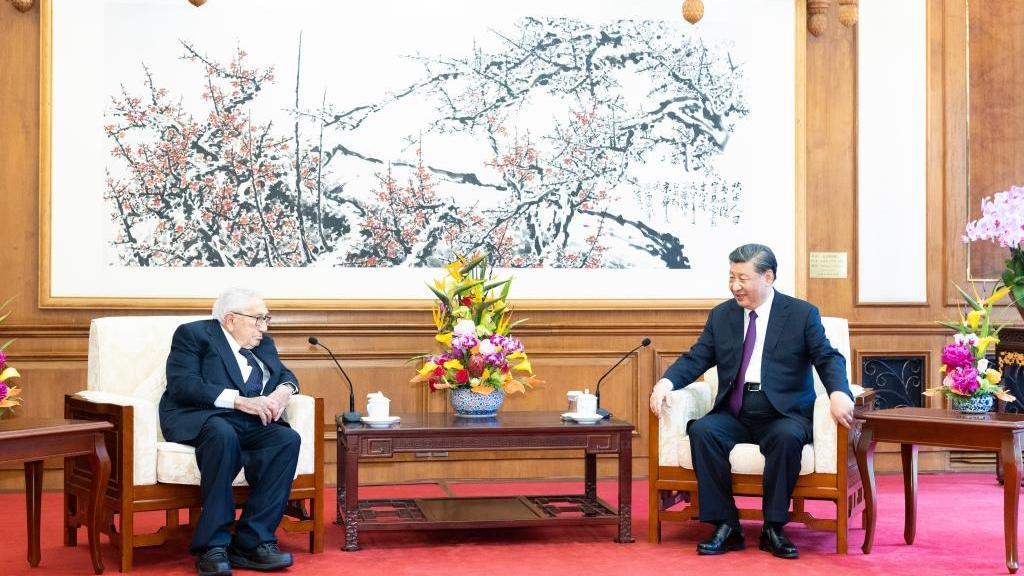
Chinese President Xi Jinping meets with former U.S. Secretary of State Henry Kissinger at the Diaoyutai State Guesthouse in Beijing, capital of China, July 20, 2023. [Photo/Xinhua]
By Danny Haiphong
At the age of 100, former U.S. Secretary of State Henry Kissinger traveled to Beijing and met with Chinese President Xi Jinping and other top officials on July 20, 2023, amid a watershed moment in China-U.S. relations.
The visit caused a great level of confusion among the Western media and members of the U.S. political class. Some outright dismissed the significance of the visit. Others expressed a "sour grapes" mentality. National Security Council Spokesperson John Kirby demonstrated this reaction best in his claim that it was "unfortunate that a private citizen can meet with the defense minister and have a communication and the United States can't."
Outside of the political class, social media users in the U.S. have gone so far as to claim that China misunderstands Kissinger's true role in the world. Critics remarked that while Kissinger played a major role in normalizing ties between China and the U.S., his tenure within the foreign policy establishment has also been characterized by aggressive U.S. interventions in Vietnam, Laos, Chile, and several other countries. Thus, few on the U.S. side have attempted to truly understand China's side.
Kissinger's visit marked an important opportunity not only for China but also humanity as a whole. China-U.S. relations are not simply bilateral in nature. The relationship between these massively influential countries makes an impact on everyone, and everything, living on this planet.
What are the key takeaways, then, from the latest Kissinger visit?
First, high-level diplomacy is not a zero-sum game. President Xi called Kissinger an "old friend" because he has visited China over 100 times and is remembered for his leading role in bringing China-U.S. relations to their highest point.
China has followed diplomatic protocol with the U.S., consistently emphasizing in both word and deed mutually beneficial and peaceful relations with the United States. However, Kissinger's visit was urgently necessary because of the U.S.'s commitment to containing China and therefore undoing diplomatic relations via a zero-sum approach.
Besides, Kissinger's warm reception sent a strong message to the U.S.-side that China is ready to engage in dialogue to restore ties on the correct path. It is therefore the responsibility of the United States to reciprocate in kind. High-level meetings with U.S. Secretary of State Antony Blinken, Treasury Secretary Janet Yellen, and Climate Envoy John Kerry have marked a positive period for dialogue between the two sides.
However, these conversations have yielded few concrete results. The U.S. has not ceased any of its unilateral policies toward China such as the trade war or its continued sanctions on China's Defense Minister Li Shangfu which have stalled talks on matters of defense cooperation.
Lastly, Kissinger's latest visit to China is a clear indication that hubris and hegemony have become a ball-and-chain in progress. Cold wars plant the seeds of a hot war. Kissinger's concern over the possibility of major power conflict is not unfounded historically. The first Cold War not only brought the world dangerously close to nuclear conflict but also caused great suffering for poorer nations caught up in the West's project of "containing" communism. However, unlike the first Cold War, the policy of aggression toward China has harmed the U.S.'s standing in the world rather than bolstered it.
As President Xi correctly notes, the world is experiencing changes not seen in a century and China has played a positive role in them. U.S. hostility toward China has put its foreign policy at odds with the majority of nations that share a common interest with China in peaceful and prosperous development.
Over the course of the last five to 10 years of worsening China-U.S. relations, the emergence of a multipolar world has accelerated. Multilateral arrangements such as China-proposed Belt and Road Initiative, the Shanghai Cooperation Organization, BRICS, and the Regional Comprehensive Economic Partnership have grown rapidly as more countries seek sovereign development through greater regional and global integration. More countries are seeking alternatives to the U.S. dollar and the unfair economic relationships that have emerged from its dominance.
The era of hegemony for any country is therefore coming to an end. Kissinger's visit placed a spotlight on the choices in front of the U.S. elite that seek to preserve U.S. hegemony at all costs. The choices are as follows: set relations with China on the correct path for the sake of stability and common prosperity or continue on the path of self-isolation and destruction through provocation. China has made clear that its preferred path is diplomacy. Now it is up to the U.S. side to decide whether it is capable of walking on this path.
Danny Haiphong, a special commentator on current affairs for CGTN, is an independent journalist and researcher in the United States. He is a contributing editor to the Black Agenda Report, co-editor of Friends of Socialist China, and founding member of the No Cold War international campaign.

 中文
中文



